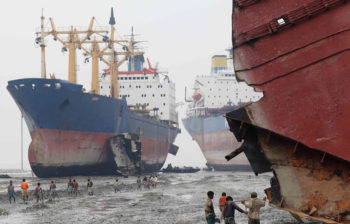
By Jite Eriabie
Six workers died and at least eight were injured in ten separate accidents at Bangladeshi shipbreaking yards over the past two months, according to NGO Shipbreaking Platform.
The figures are a testament to a surge in the number of accidents at Bangladeshi yards this year, despite a decrease observed until September, the NGO said.
Due to the latest fatalities NGOs are calling on the Bangladesh government and ship owning nations to hold business accountable.
On October 23, Jalal, who worked as a cutter man, died struck by a cable at Arafin Enterprise, the yard where the product tanker Lobato, owned by Petrobras, is currently being scrapped.
The vessel was exported from Brazil and arrived in Chittagong in October, despite calls from the Platform asking the Brazilian Government to stop the beaching practice of Transpetro, part of Petrobras. The company is said to have sent more than twenty vessels to the beaches of India and Pakistan in the last five years.
In addition, a shipbreaking worker died while working on an oil section of the Indonesian-owned tanker Echo, beached at Ferdous Steel shipbreaking yard. One more worker was injured in that accident.
Another worker is reported to have lost his life on November 14, following a fall from the ship Labri, sold for breaking by the Greek Polys Haji-Ioannou Group, after a fire broke out on the upper deck. Four more workers suffered injuries due to a fire at Tania Enterprise shipbreaking yard.
On December 4, a worker named Mojammel, working at the SN Corporation yard on the ship INOX, suffocated from inhaling toxic gases. The ship was owned by the Hong Kong-based HNA Group International.
A body of a worker of PHP shipbreaking yard identified by local newspaper in Chittagong as Harun Rashid, was found lifeless in a pond close to the yard. The worker’s cause of death has not yet been cleared by the police. Another PHP worker suffered an injury to his left leg and has spent the last three weeks in the BSBA Hospital receiving treatment, the Platform added.
Details on the remaining 2 injuries and the 1 death at the shipbreaking yards are still unclear, NGO Shipbreaking informed.
In October, two major accidents also occurred in the steel re-rolling mills that are connected to the shipbreaking yards and where the steel from the ships are re-rolled into steel bars. According to the Bangladesh Insitute of Labour Studies (BILS), on October 10, four workers died in GPH Ispat, and less than a week later an accident at SARM re-rolling mill killed one worker and injured nine.
“The working conditions in all the Chittagong shipbreaking yards are deplorable. Claims that the situation in the yards has somewhat improved are misleading: workers are still exposed to enormous risks and are killed because of the lack of basic safety procedures and infrastructure”, says Muhammed Ali Shahin, local contact of the NGO Shipbreaking Platform.
The string of accidents and unsafe working practices at South Asian beaches used for dismantling of ships has resulted in shipowners being brought to court for their reckless shipbreaking practices for the first time.
Mohamed Edris, who also worked at Ferdous Steel, was severely injured in 2015 while cutting the Eurus London, owned by Zodiac Maritime, and is now seeking compensation in the UK courts from the shipping company.
“This case could set a precedent for other workers who want to bring the ultimate profit-makers of dangerous and polluting practices to justice,” the Platform commented.
So far this year, 51 out of the total 152 ships that have been beached in Chittagong are owned by European companies. According to NGO Shipbreaking Platform, these include Zodiac, Teekay, Berge Bulk and Costamare, which have sold ships to the Chittagong beach this year.